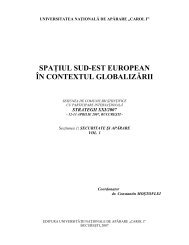PROVOCĂRI LA ADRESA SECURITĂŢII ŞI STRATEGIEI LA ÎNCEPUTUL SECOLULUI XXI
provocări la adresa securităţii şi strategiei la începutul secolului xxi
provocări la adresa securităţii şi strategiei la începutul secolului xxi
Create successful ePaper yourself
Turn your PDF publications into a flip-book with our unique Google optimized e-Paper software.
Rehabilitation territories damaged in the Nagorno Karabakh<br />
conflict that are occupied by Azerbaijan including the rehabilitation of a<br />
railway line to Fizuli, electricity supplies, drinking water and irrigation and<br />
the reconstruction of schools.<br />
The Tacis programmes since 1998 have concentrated on public<br />
sector reform and since 2002/3 put a stronger emphasis on poverty reduction<br />
following the adoption of a Poverty Reduction Strategy by Azerbaijan in<br />
late 2002. Below you find a table showing the main themes of the Tacis<br />
programmes for the period 1998-2006.<br />
With the entry into force of the PCA and the improvement of the<br />
economic situation in the country the focus of EC assistance is shifting from<br />
humanitarian aid to rehabilitation, reconstruction and the promotion of trade<br />
and investment ties in between EC and Azerbaijan. EC assistance will also<br />
be used increasingly to reduce tensions resulting from the Nagorno-<br />
Karabakh conflict by supporting regional cooperation, post-conflict<br />
rehabilitation and by linking assistance levels to progress in conflict<br />
resolution.<br />
EU feels strongly that the Minsk Group (OSCE) offers the best<br />
mechanism for the settlement of the Nagorno Karabakh issue and fully<br />
support the efforts made by the Azeri Government and the Armenians to<br />
improve dialogue in recent months. Until progress is made over Nagorno<br />
Karabakh regional stability will continue to be threatened and development<br />
stifled.<br />
INOGATE (cross border energy initiative funded by Tacis) started<br />
the implementation of cross border small scale investment projects as a<br />
follow up to the Umbrella Agreement. Projects for the three Caucasus<br />
countries, such as improving cross border metering are included.<br />
The future development of EU-Azeri relations is set out in the PCA<br />
and the Joint Declaration adopted in the Luxembourg Summit. The main<br />
issues will be implementation of the PCA, promotion of trade, investment<br />
and conflict resolution and EC assistance should focus on these areas.<br />
The Commission in May 2004 recommended the inclusion of<br />
Armenia, Azerbaijan and Georgia within the scope of the European<br />
Neighbourhood Policy. The Council of Ministers is expected to take a<br />
decision on the Commission recommendation in June 2004. The European<br />
Security Strategy, adopted by the European Council in December 2003,<br />
clearly identifies the South Caucasus as one of the regions in which the EU<br />
should take a "stronger and more active interest".<br />
NOTES:<br />
[1] The countries concerned by our Wider Europe initiative, said<br />
Günter Verheugen, form an area with close to 400 million inhabitants, i.e.<br />
of the same order of magnitude as the Union of 25. Günter Verheugen, EU<br />
Enlargement and the Union’s Neighbourhood Policy, Diplomatic Academy,<br />
Moscow, 27 October 2003.<br />
[2] Günter Verheugen, EU Enlargement and the Union’s<br />
Neighbourhood Policy, Diplomatic Academy, Moscow, 27 October 2003.<br />
“In the East, Russia is of course much more than a neighbour, since it is a<br />
strategic partner; but it is also a neighbour; and then Ukraine, Belarus and<br />
Moldova. In the South the 10 countries of the southern Mediterranean,<br />
including the Palestinian Authority. Relations with Bulgaria, Romania and<br />
Turkey are not included, since these are candidate countries. The Western<br />
Balkans are also excluded, since, as mentioned, these countries too have<br />
been offered a clear accession perspective”.<br />
[3] Romano Prodi, A Wider Europe – A Proximity Policy as the key<br />
to stability, speech to the Sixth ECSA-World Conference, Brussels, 5-6<br />
December 2002, SPEECH/02/619.<br />
[4] The December 2002 Copenhagen.<br />
[5] Communication from the Commission to the Council and the<br />
European Parliament, Wider Europe— Neighbourhood: A New Framework<br />
for Relations with our Eastern and Southern Neighbours, Brussels,<br />
11.3.2003, COM (2003) 104 final.<br />
[6] The Presidency Conclusions of the Brussels European Council<br />
(17 and 18 June 2004).<br />
[7] “We are presently exploring ways to improve co-ordination<br />
between various Community programmes involved in such activities. We are<br />
also exploring ways to facilitate local border traffic, while maintaining the<br />
high level of border security required by our Schengen acquis. For the<br />
period after 2006 we are considering an increase in our financial support<br />
and a substantial reform of the framework of cross-border-co-operation.<br />
This would improve the planning, co-ordination and implementation of cooperation<br />
on both sides of our borders”. Günter Verheugen, EU<br />
Enlargement and the Union’s Neighbourhood Policy, Diplomatic Academy,<br />
Moscow, 27 October 2003.<br />
[8] “It is obvious that our neighbours differ largely. So do their<br />
relationships with us. Ukraine is not Egypt and Israel is not Moldova.<br />
Russia is a strategic partner. Hence differentiation is a key notion in our<br />
neighbourhood policy. Our relations also reflect different sets of common<br />
319<br />
320



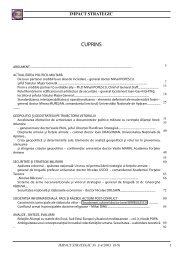

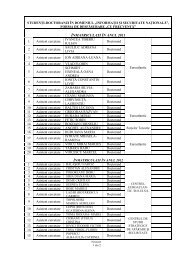
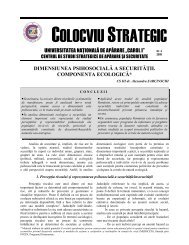
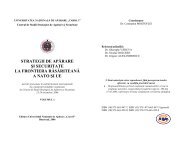
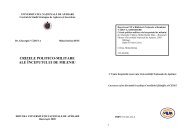
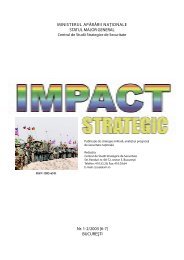


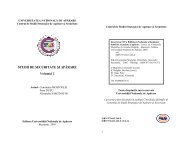
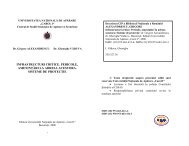
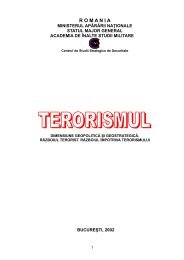

![„CAROL Nr 4 [29]/2008](https://img.yumpu.com/53801719/1/184x260/carol-nr-4-29-2008.jpg?quality=85)
